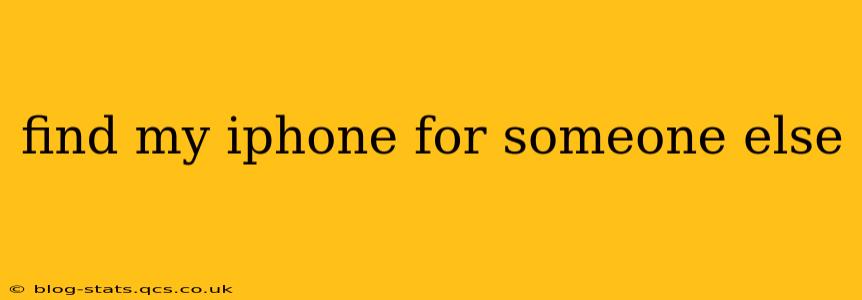Finding someone else's iPhone can be tricky, but it's possible if you have their permission and access to their iCloud account details. This guide will walk you through the process, addressing common concerns and clarifying the necessary steps. We'll cover various scenarios and address potential privacy concerns.
Remember: You must have the owner's explicit permission before attempting to locate their iPhone. Accessing someone's iCloud account without their consent is a serious breach of privacy and potentially illegal.
How to Locate Someone's iPhone Using Find My
The primary method for locating a lost or stolen iPhone is through Apple's "Find My" app or website. This requires knowing the Apple ID and password associated with the device.
Here's what you need:
- The owner's Apple ID and password: This is essential. Without this information, you cannot access the Find My functionality.
- Their consent: Make absolutely sure they are comfortable with you accessing their location data.
Steps:
- Access Find My: Go to iCloud.com/find or use the Find My app on your own iOS device.
- Sign In: Use the owner's Apple ID and password to log in.
- Locate the Device: The app or website will display the iPhone's last known location. If the device is online, the location will be more precise.
Important Considerations:
- Offline Mode: If the iPhone is offline (turned off, no cellular or Wi-Fi connection), its location will not be updated. The last known location will be displayed.
- Privacy Settings: The iPhone owner's privacy settings might affect the level of detail shown. They may have disabled location services for certain apps, impacting the accuracy of the location information.
Can I Find Someone's iPhone Without Their Password?
No. You absolutely cannot locate someone's iPhone without their Apple ID and password. Apple's security measures are designed to protect user privacy. Attempting to bypass these measures is unethical and illegal.
What if the iPhone is Lost or Stolen?
If the iPhone is lost or stolen, using Find My can help. Beyond locating the device, you can also:
- Play a sound: This is helpful if it's nearby.
- Put the iPhone in Lost Mode: This locks the device and displays a custom message with your contact information.
- Erase the iPhone: This will wipe all data from the device, protecting the owner's personal information.
Is it Legal to Track Someone's iPhone Without Their Knowledge?
No. Tracking someone's iPhone without their consent is a serious violation of privacy and may be illegal, depending on your location and local laws. This is considered a form of stalking in many jurisdictions.
Frequently Asked Questions (FAQs)
How accurate is Find My iPhone?
The accuracy of Find My depends on several factors, including the device's connection to a cellular network or Wi-Fi, the iPhone owner's privacy settings, and whether the device is turned on. If the device is offline, the location shown will be the last known location before it went offline.
What if the iPhone is turned off?
If the iPhone is turned off, Find My will not be able to update its location. It will only show the last known location before it was powered down.
Can I use Find My iPhone to track someone's location continuously?
While Find My provides location information, it's not designed for continuous real-time tracking. The location updates intermittently, depending on the device's connection and activity. Continuous tracking without consent is illegal and unethical.
What happens if the iPhone is completely wiped?
If the iPhone is erased, using Find My will no longer work, as all data, including the association with the Apple ID, is deleted.
This comprehensive guide clarifies the process of using Find My iPhone for someone else while emphasizing the crucial importance of consent and legal considerations. Remember to always respect the privacy of others and only access location information with explicit permission.
